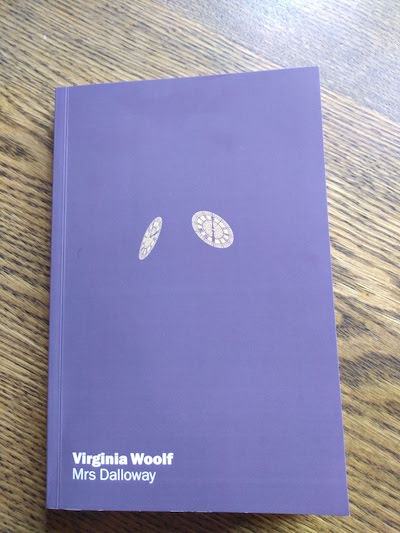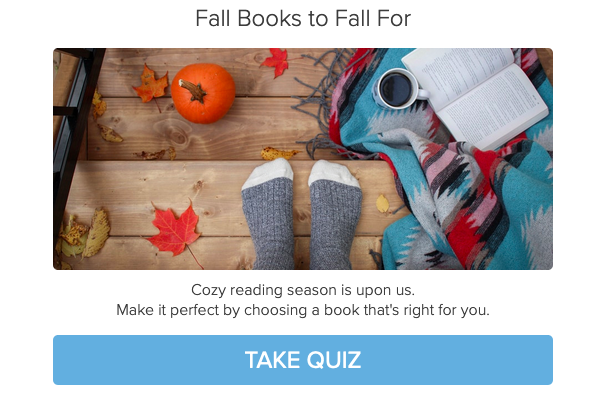April 28, 2021
New Literary Quiz!
[interact id=”60832d572a5b4e0017c5017b” type=”quiz” mobile=”false”]
November 6, 2020
Has Women’s Fiction Helped to Save Us?

Almost four years ago exactly, against the background of a horrifying US election outcome and a world I didn’t recognize, I wrote a blog post entitled “How Women’s Fiction Can Save Us All.”

Which was more than a little bit self-serving, of course, considering my debut novel, Mitzi Bytes, was coming out the following spring.

So it was kind of like your mechanic telling you how replacing your muffler kills fascists, or the real estate agent explaining how buying a town-home is the only sure route out of an authoritarian disaster. My post was totally ridiculous, over-earnest and embarrassing, but those were heady times and also—and here’s the pivotal thing—I wasn’t wrong.

And just how wrong I wasn’t occurred to me this morning as I scrolled through bestselling author Emily Giffin’s Instagram stories, which have been my go-to through this strange uncertain week while American votes are counted. All week long, Giffin has been unwavering in her confidence that America—and her home state of Georgia in particular—would deliver the Biden/Harris ticket a victory.

For months, Giffin’s feed has been decidedly political, anti-Trump sentiments, pro-LGBTQ and Black Lives Matter. Amidst snapshots of Charles and Diana, and Brad Pitt and Jennifer Aniston, of course—Giffin’s Insta is a world onto itself. But no matter the followers who threatened to unfollow and or to boycott her novels, Giffin has been insisting on making it political most of the time.

(It only underlines my thesis too that Stacey Abrams— whose fight against voter suppression since losing her Governor race in 2018 deserves huge credit for turning Georgia blue—includes “romance novelist” among her many other accomplishments.)

And Giffin has been taking her politics offline as well. Her 2018 novel All We Ever Wanted was a powerful exploration of toxic masculinity and the ways in which privileged white women are culpable in perpetuating it.

It joined other novels like Jodi Picoult’s A Spark of Light, also published in 2018, delving into the personal stories behind the polarized issue of abortion. 2018 was also the year Tayari Jones published An American Marriage, which would go on to win the 2019 Women’s Prize for Fiction, painting plain the reality of being a Black man (and a Black wife) in America.

And these books were not anomalies. Candice Carty-Williams’ Queenie was billed as a Black Bridget Jones when it came out in 2019, but where Bridget was sliding down fireman’s poles (and more power to her!) Queenie was writing about US police shootings. Chick-lit queen Jennifer Weiner’s 2019 novel Mrs. Everything takes on more than a half-century of American misogyny and missed opportunities for women to succeed.

Celeste Ng’s smash hit 2017 novel Little Fires Everywhere is a devastating indictment of race, class and privilege and the outsized role they play in a very unequal America.
And Meg Wolitzer’s Female Persuasion, and Brit Bennett’s The Vanishing Half, Such a Fun Age, by Kiley Reid, Miracle Creek, by Angie Kim, and so many more.
In Canada, novelists Marissa Stapley and Karma Brown have penned fierce and furious feminist bestsellers with The Last Resort and Recipe for a Perfect Wife.

In further signs of progress since my post four years ago, the commercial fiction landscape in Canada has evolved beyond being a boring monolith of white writers, with the success of books like Uzma Jalaluddin’s Ayesha at Last and Farah Heron’s The Chai Factor, both of which manage to tackle racism and anti-Muslim hate in the context of love stories (no mean feat!). And even better, underlining that “diverse stories” (I hate that phrase) aren’t just a flash in the pan—both of these authors have new novels coming out next year.

And more commercial novels by Canadian authors of colour? Check out Jane Igharo, Roselle Lim, Jennifer Hillier, crime novelist Ausma Zehanat Khan, and YA novelist SK Ali, among others. The very existence of books centring the experiences of characters of colour is a political act, and many of these authors don’t shy away from more overt politics either, as they write plots that are also romantic, compelling, and great.

(Um, and yes, I have a new book out again, a novel about power and politics and the myths we create about ordinary men and leadership, and what we do about men who might not be monsters but whose behaviour is not okay.)
This week I listened to the CBC Pop Culture podcast Pop Chat, which considered the pop culture response to US politics over the last four years, determining that the output (mainly bad Saturday Night Live sketches) had been fairly disappointing, films like Get Out and Parasite aside. (They didn’t even mention Demi Lovato’s “Commander in Chief” though! I love that song!)
The consensus being that a US president who sucks all the air out of the atmosphere as the 45th did (DID. I’m doing past tense. I’m going there. It’s been too long. I AM READY), who is so over-the-top and in defiance of credulity and reality, whose entire construct of the world seems to be a fiction—well, what are artists meant to do with that?
But the women who write commercial fiction have done a lot, responding to the moment and truly rising to the occasion.
These books—part of a genre that so rarely gets the respect it deserves—are one terrific legacy of this terrible, awful time. When people look back at these works published during the second half of the last decade—at the questions these authors have been grappling with, the issues confronted head-on, the taboos finally broken, voices being heard, stories that are finally being told—I hope it’s going to seem obvious that the patriarchy was on its final legs, quaking in its ugly boots.
And good riddance.
October 18, 2020
How I Made My Children Readers: My ONE Magic Secret
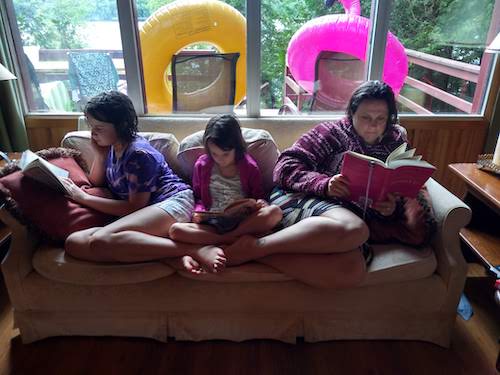
Okay, as everybody knows, my children are readers because LUCK and because they happened to be born with those inclinations, and because they are fortunate that reading comes easily for their brains. LUCK also that neither of them decided to hate reading out of spite, because their mom was just way too into it. (I was anticipating this. Have done my best—and no doubt failed—not to be too much about the whole reading thing, and give them space to develop their own tastes and connection to reading that was not just an extension of mine.) This is probably 75% of the formula.
In addition, books and reading are an essential part of our family culture, they see me and their dad reading all the time, I’ve surrounded them with excellent books since before they were born, and it’s rare that they’ve ever taken a journey that didn’t end at a bookshop (and then ice cream).
But my magic secret to raising readers is none of these. My magic secret is much less wholesome, is sexist and outdated, and is available in digest form at your local grocery store. My magic secret to raising readers is ARCHIE COMICS.
And here’s why.
1 ) I buy them at the grocery store checkout, along with milk and cheese and breakfast cereal, underlining the point that reading materials can be staples, sundries just as essential as toilet paper and dish soap. They’re always appreciated, and special enough to turn up in Christmas stockings, but they’re kind of viewed there the way that socks in the stockings are. Nice to have, but ubiquitous.
2) Ubiquitous, which is to say accessible. They’re cheap. Can be taken for granted. Unremarkable. They’re just always around.
3) Being so accessible, they’re also disposable. They’re the books my children bring to the table at lunchtime because nobody cares if they get splattered with soup. Nobody has to be precious with a book like this.
4) These are also stories that ask little of their readers. They don’t require a lot of attention or brain power. They’re perfect for if you’re really tired. My daughter likes to read one as a palette cleanser after reading something intense or demanding before bed. They’re not edifying. In short, they are basically literary candy. Unlimited literary candy. And unlimited candy is basically every kid’s dream. (Just don’t tell them that they’re building literacy as a lifelong habit!)
5) I bought two comics last week when we were waiting in the drug store for our flu shots. Archie comics pass the time, and because they’re broken up into pieces, you can read them at three minute intervals or for ages and ages. Picking them up and putting them down is easy , and so they’re really easy to integrate into the course of one’s day. SEVERAL TIMES.
And because they’re so ubiquitous, there’s usually a small pile of them within arm’s reach anyway. Nobody has to go out of their way, which is just the way literacy training ought to be.
September 25, 2020
How to Be a Champion, and Not a Sycophant
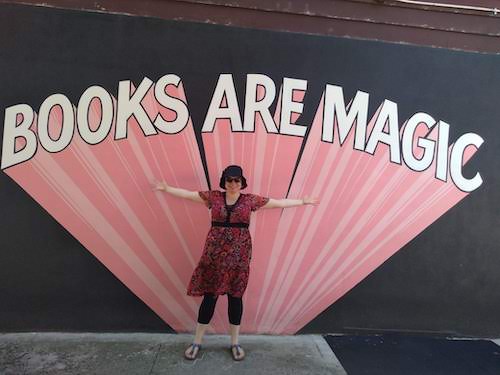
Some of my most important mentors have been the people who said no to me, the people who couldn’t accommodate my request, who didn’t want to help, who had better things to do than answer my email. From these people, I have learned that I too can set my own boundaries and limits, that none of us are required to be everything to everyone.
And so similarly was I impressed last spring when I approached a fellow author-friend for a blurb for my forthcoming novel, and she responded with a caveat—she would agree to read my book, but not necessarily to endorse it. Because how could she know if she hadn’t read it yet, and as a person who aspires for everything to mean what it means, this was a particularly powerful moment.
This story has a happy ending too, because this person really liked my book. And how much more her endorsement meant to me because it wasn’t granted automatically, because it meant something. But even if she hadn’t endorsed it, I would have admired that too. A sign that honesty and integrity are not as rare as one might think. And yes, my ego would have taken a bit of a bruising, but every public-facing person benefits from such an exercise from time to time.
Last week I wrote about the importance of making space for promoting books and reading, but this doesn’t require one to have to love everything. “The standards we raise and the judgments we pass…” Virginia Woolf refers to in “How Should One Read a Book,” and those standards and judgments are important. Not because they are the law, because they aren’t, and different readers and critics will have different standards and judgments, which is just the way it should be (and this is the great thing about making space—there can be enough of it to go around).
If you are making space and not adhering to your standards and judgments—raving about books you thought were terrible, blurbing books you’ve never read, recommending titles about which your take was mostly “meh,” holding your nose to post about a title your favourite publicist has sent you which is not your cup of tea, writing about a book that was rubbish but the author is super nice—then the space you are creating is not going to be very meaningful. And sometimes these kinds of situations are difficult to avoid, particularly if you are new to a community or less sure of your taste or less confident as a critic. But I would advise you to find yourself in these situations as little as possible to preserve your own literary reputation, your sense of self, and on behalf of the cause of better books, which is a cause we all can believe in.
Here’s how you can do it.
- If you can’t say no outright to review/blurb requests (it takes courage to be that bold) then you can make excuses. A lack of time is something nobody is going to argue with. Be vague. Don’t reply to emails. They’ll get the point. (There are people who will claim I am being unfair here, and that you owe it to authors to be honest and upfront. I have tried this. It has never gone well, and I will never do it again.)
- Build your wheelhouse. Most historical fiction, books about young men coming of age, novels with child narrators and fiction about philosophers I’ve never heard of are outside mine, which makes it easy for me to ignore these books without compunction.
- If that author on Instagram is super nice (even if she is me, although I am not that nice) and her book just didn’t jive with you, you don’t need to post about it. Even if she put it in her mailbox with her own two hands. The favour you did her was trying out the book at all. It’s not your fault if it didn’t work. And perhaps you can write a critical post that highlights the book’s redeeming features, but if none of those features can be found, just let it go.
- Be as brave as my friend and don’t agree to blurb a book you haven’t read yet. If you do agree to blurb a book that turns out to be terrible, fail to meet the deadline.
- Understand that a book may not be to your taste, but someone else might enjoy it. And that is terrific. Because you got to be honest with yourself and your audience and the book still got love. There is enough to go around without you bending over backwards.
- Know that it is not your job to take care of everybody
- And understand that your word is only ever going to mean anything if you mean the things you say. Your platforms matter. Use them wisely, smartly, and don’t water them down. And yes, we could be all throwing up our hands about declining ways to get the word out about books (and we do! And we are!) but that makes it all the more important to preserve the integrity in the places/platforms that are still available.
September 18, 2020
How to Do Self-Promotion
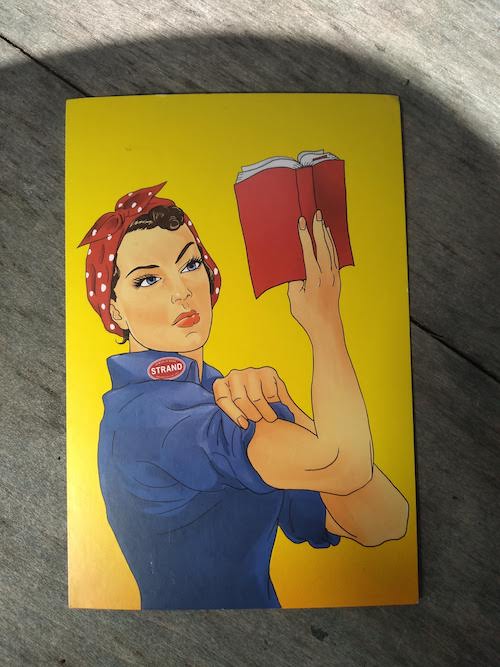
“There is nothing wrong with self-promotion!” someone tweeted at me a few weeks ago, an attempt at encouragement that demonstrated that they don’t know me very well, because clearly, I already know this . If I could afford to buy billboards for my selfies, I probably would. I really do hope that you will pre-order my new book (coming October 27 from Doubleday Canada!), is what I’m saying, but also that all self-promotion is not good self-promotion. There is a certain kind of grace required.
This all started because I have the best part time job ever, and I work with the best people , who fill my life with goodness and have been so supportive of my work for the past nearly-ten years. And my job involves getting excited about Canadian books, which is the greatest pleasure, and comes pretty naturally to me. But I am careful not to use this particular platform to promote my own work. I have other platforms after all, and it would be more than a little gauche. For me to include my book on the site’s Fiction Preview, for example, a project I care very much about and work hard on compiling.
So I didn’t, and my friend/colleague Kiley didn’t notice (it was a very busy summer!) until my book ended up on the Toronto Star and CBC Books’ Fall Previews the other weekend. And then she tweeted from the 49thShelf account about my forthcoming book, and how I hadn’t included it on our list. I replied that it’s kind of tacky to put your own book on your own list, and that it is to be hoped instead that somebody else might be anticipating my book, someone who isn’t even me—a gamble that had paid off (phew!) because at least two media outlets were.
Um, and yes, props to my fantastic publicist at PRH, of course. I suppose it’s easier to be kind of laissez faire when you have such people in your corner. It’s not all karma, is what I’m saying. But some of it actually is.
And what I mean by this is that the best way I know to do self-promotion is to create the space, instead of focusing on my own book specifically. This is a long-term goal, of course. You don’t start this six weeks before your pub date. Instead, you use whatever platforms you have—both digitally and in the actual world—with the intention of creating meaningful conversation, in my case about books and reading in general. Supporting a culture of literature in the places I hang out in, connecting with others who do so. And this culture matters. As Virginia Woolf wrote 95 years ago of the importance of readers in her essay “How Should One Read a Book?”—“The standards we raise and the judgments we pass steal into the air and become part of the atmosphere which writers breathe as they work.”
So how to create this space? Maybe you have a book blog. Maybe you interview writers on Youtube. Maybe you started an online literary magazine. Maybe you post about the books you love on Facebook. Maybe you run a reading series. Maybe you post photos of your library haul on Instagram. Maybe you talk about books exuberantly to the people you encounter in your everyday life. Maybe you support independent bookstores/ Maybe you read conspicuously in public. Maybe you do things to support the spaces that were created by other people, attending literary events, buying books, reading book reviews. Maybe you listen to books podcasts, and then tell other people about the books podcasts. Maybe you write Goodreads reviews, and leave reviews on Amazon—although even typing this makes me nauseous because nothing associated with Amazon is good for anybody, so if these are your tactics, perhaps think of one more.
The point of this space you’re creating is still not to promote your own book. Forget about your own book, for now. This is not about you. The point of this space you’re creating is to make more room in the world for books and readers, and even just a little tiny bit more space means something significant. And you’re benefiting from this space, because you are a reader, and you live in the world, and you’ve done your part to make the world a little closer to the kind of world you want to see—where books and reading matter.
And then, yes, because there is more space, there will also be more room for you and your book. Because you’re steeped in the atmosphere of books and reading, it will not seem so awkward to make your own book a part of the conversation. And because you’ve cultivated connections and built relationships, you won’t be the only person talking about your book either, which is the kind of promotion that really matters, which is really just living the dream.
But first, you have to make that space. Talk about and share the books you really love. You are not in competition with other writers—a world where people love and value books is good for everyone, even if the books they’re loving and valuing aren’t yours. There is room enough for everyone, especially if you’re making space. The success of any writer can be a success for all writers.
Of course, feel free to take all this with a grain of salt because modest success is all I’ve ever known anyway. I’m a blogger after all, inherently on the margins. But still.
When you hear someone asking for a book recommendation, resist the urge to suggest your own book (because of course you’re going to suggest your own book). Not because there is anything wrong with self-promotion, but because it’s just too easy and obvious to create any meaningful connection. You really do have to go the long way around, but it’s worth it. Because it’s real.
September 7, 2020
Goodbye, Mildew. It’s Been Nice…
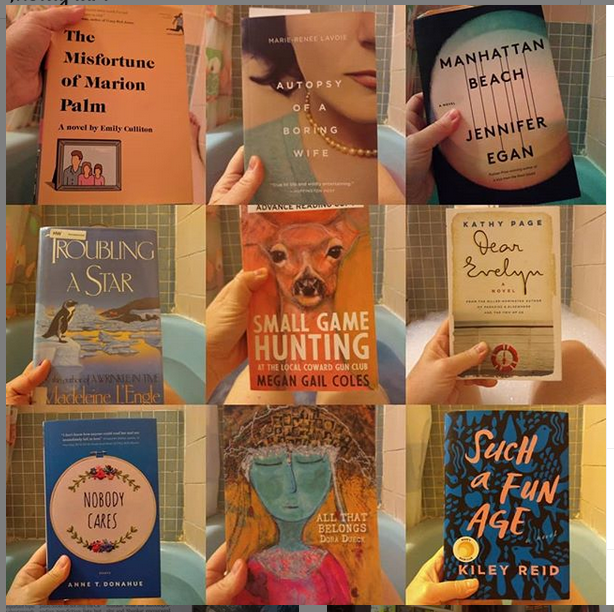
Everything sort of fell apart last week as the job of replacing our bathrooms tiles was undertaken, and then they realized the walls themselves would need to be rebuilt, and then after that the ceiling started collapsing, and it was six days before we were able to shower.
And now we have a gorgeous new bath area, with white tiles and grout that isn’t mouldy. Our previous tiles were so gross, and when you tried to scrub the grout, it fell off, which isn’t a good thing. At one point, the most substandard contractor of all time had rebuilt the tiles around the faucet in a blue tile that was completely different than the rest of the tub AND actually not the kind of tile you’d use in a bathtub anyway. It was legit the most hideous bathroom of all time, and so naturally, I took lots of photos of it and posted them on Instagram.
Reading in the tub is one of my chief delights. Because I am very spontaneous and wild, I take a bath almost every Sunday evening when the weather isn’t hot. It’s my favourite way to close out a weekend, to get ready for a week, to be submerged in a small body of water (ideal!) and having nothing to do except read.
It’s amazing to me how many beautiful book covers perfectly matched my hideous bathroom. It was like my bathroom as the palette, unlikely, the match uncanny. Check out Manhattan Beach, by Jennifer Egan, on which I was a bit meh, but still—that same blue, that same pinky orange. What are the actual odds?
I won’t have to spend as much time strategically placing my book to cover up the most shameful spots of mildew and mould now, but must confess to being slightly disappointed that the new background to my #BooksintheBath posts are going to be so bland.
Don’t worry, my bathtub is still blue, so you’ll know that it’s me.
But clean white tiles?
Very civilized, but it’s just not my brand.
July 6, 2020
Not for Me
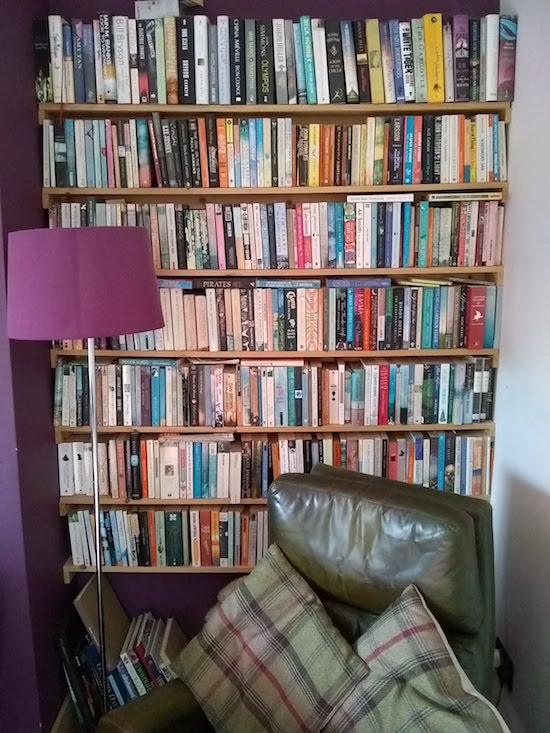
In the 21st century, it almost seems radical to dislike something in non-declarative terms. Not even with a “meh,” which is more disdainful than it seems, but instead something more along the lines of, “I tried this, and it’s not for me.”
My new thing is easing out of having strong negative opinions, unless the strong negative opinion is super interesting and worth delving into. But more often than that ever being the case, strong negative opinions seem to me to be a fancy way to dress up the fact that one simply doesn’t like a certain thing. Or maybe what I’m saying is that you needn’t necessarily develop an elaborate theory as to why a piece of art is not to your taste.
(I’m still figuring this out. It’s an ongoing process.)
I’m thinking about this because Ottessa Mosfeigh has a new novel out, and people are excited, and whenever people are excited about a novel, I want to be excited about it too. But I think I just don’t like the work of Ottessa Mosfeigh. I read Eileen and it was interesting enough, but when I finished it, I kind of thought I’d read all the Mosfeigh I wanted to read for this life. And then last summer, friends were reading My Year of Rest and Relaxation, and loving it, so I decided to give it a chance—but it was the kind of book I rejoiced at finally finishing at the fact of its being over. Even as I recognize, I do, what other readers find remarkable about it, even appealing, but it doesn’t work on me, I think. I am insusceptible to Mosfeigh’s spells.
I also (forgive me please) didn’t see the point of Jenny Offill’s Department of Speculation. It didn’t work for me. I don’t understand the appeal of “art monsterdom” anyway (could a distaste for monstrousness be at the root of my feelings about these books, I wonder?). I own a copy and at least it’s short, so I’ve been able to read it more than once, to try to figure out what everyone else was seeing in it—and I’m not quite ready to abandon Offill yet, but I don’t want to shell out cash for her latest novel either (it’s hardcover!) so am on the library holds list, where I’ll probably be waiting for hundreds of years.
Now, of course, there are plenty of books I do think are terrible, and if we ever meet up for a drink, I’ll probably tell you all about them, but I’m thinking about something different here, things that are good that I still don’t like, and how that’s okay, both for me and the people who like them.
July 25, 2019
Find Your Next Perfect Summer Read

I made a brand new literary quiz to help you find your next perfect summer read! The results will be a bit familiar if you’re a frequent reader here on the blog, but this will help you decide which one to read first. You can take this quiz here!
April 3, 2019
Mrs. Dalloway: Redesigned
I like to read in a stream of literary consciousness, unplanned, meandering, one book leading to another in an organic fashion that I need not think about too deeply, but it just makes sense. My logical mind is not in charge of it, though things like library due dates factor in, and also whether or not a hardcover will fit into a particular handbag, or just how appropriate a book might be for the beach. But for the most part, I let the books decide, like how I was finishing up All the Lives We Ever Lived last week, and then Mrs. Dalloway turned up in my mailbox.
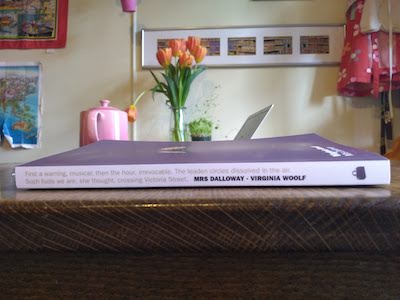
Mrs. Dalloway is the latest release from Ingrid Paulson’s Gladstone Press, which also published The Age of Innocence, a book I read over Christmas and turned me into a full-fledged Gladstone Press enthusiast. And when I heard that Mrs. Dalloway would be the first of their 2019 releases, I was ecstatic, because I love this book. a book I’ve returned to several times since I first learned to read Virginia Woolf (for me, it was not instinctual) twenty years ago when I was an undergraduate. It’s funny, because while I like to read in a stream of literary consciousness, the act of actually reading stream-of-consciousness is not my ideal. Because it’s hard and you have to pay attention and nothing’s fastened you to the plot so you have to do all that work yourself.
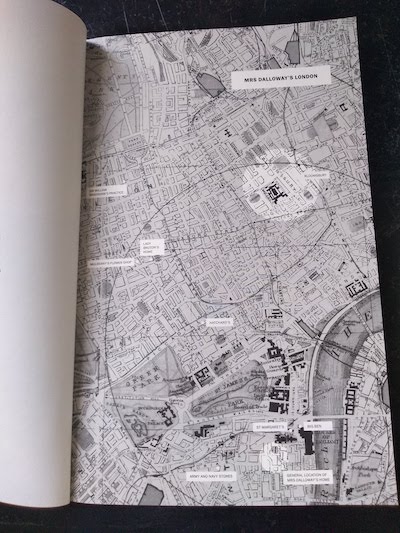
But I can do it with Woolf, with Mrs. Dalloway. Not getting too caught up in the details, letting the atoms fall where they may. It takes practice, and confidence, and patience, but I find it so rewarding. And easier too in a book that’s brand-spanking new, with a map even (my second-hand Penguin paperback that had once belonged to someone called S. Hull, according to the title page, didn’t have that) so I could follow Mrs. Dalloway, and Septimus Smith, and Peter Walsh through the streets of London, through the hours of day in June, right up to the party. For which Mrs. Dalloway had bought the flowers herself.
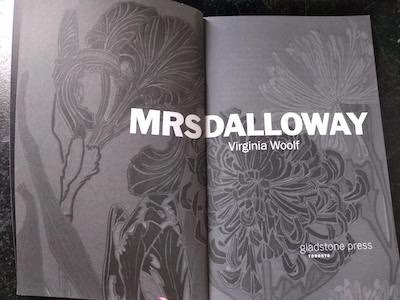
Gladstone Press books are available for purchase via their website, and are also currently for sale at Type Books on Queen Street West in Toronto. And as for me, my walk with Mrs. Dalloway led next into a walk with Alicia Elliott in her extraordinary and now bestselling essay collection A Mind Spread Out On the Ground, and then to Anna Burns’ award-winning Milkman, which is another walking book. And I’ll keep you posted as to where my literary journeys take me next.
